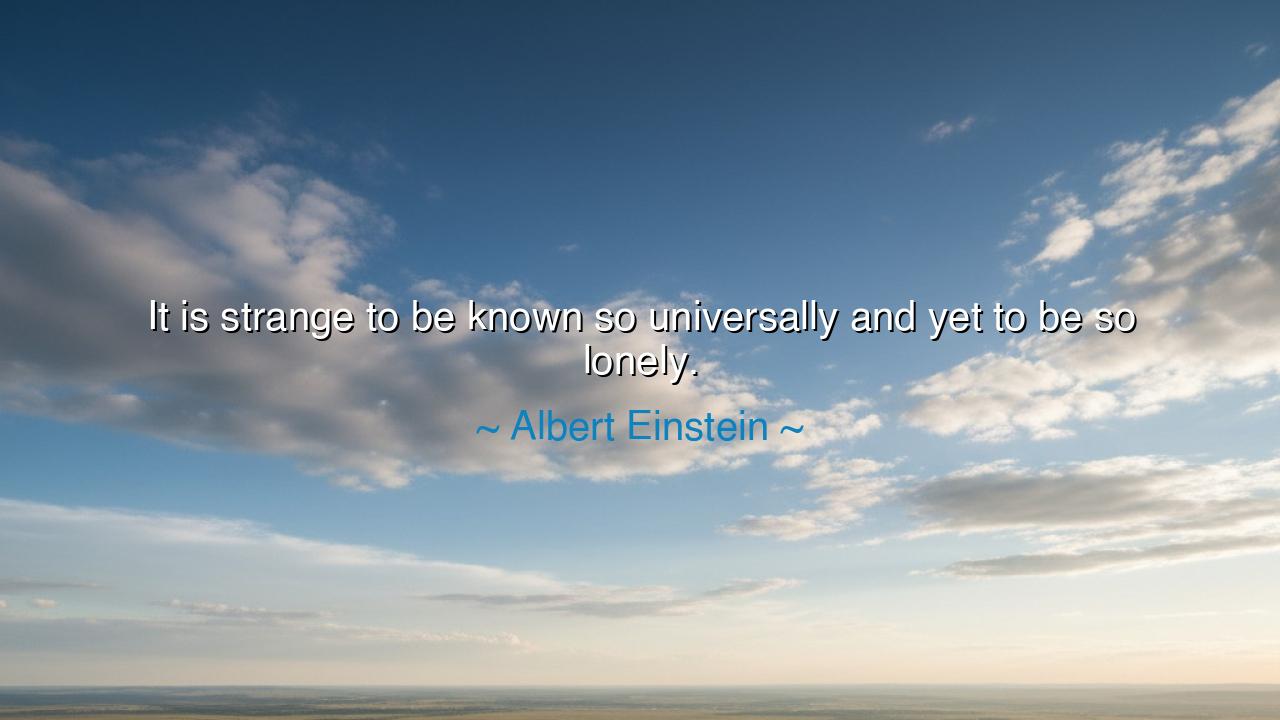
It is strange to be known so universally and yet to be so lonely.






"It is strange to be known so universally and yet to be so lonely." These words from Albert Einstein reflect a profound paradox—the deep isolation that often accompanies fame. In a world where we increasingly celebrate those who achieve great renown, Einstein’s reflection speaks to the haunting reality that public recognition does not necessarily equate to personal connection or fulfillment. To be known universally, as Einstein was, is to be seen by many, admired by millions, and celebrated for one’s achievements. Yet, in the depths of such recognition, loneliness can creep in—an unspoken distance between the self and the world, between the celebrated persona and the inner soul.
In ancient times, fame was also a double-edged sword. Consider the life of Alexander the Great, whose military conquests made him famous far and wide. He was known and revered as a leader and warrior of great prowess, yet those closest to him noted his isolation. As he moved across vast territories, often surrounded by his troops, he was cut off from true human connection, the kind that comes from shared experiences and mutual understanding. Though many revered him, few truly knew him. This kind of loneliness was not the absence of people but the absence of genuine relationships, the inability to connect on a deeper level with those who only knew his public image.
Similarly, Socrates, the great philosopher of Athens, though admired for his wisdom, also faced a kind of solitude that comes from being misunderstood by the masses. Socrates did not seek fame, but his teachings, often confronting the beliefs of the Athenian people, led to a form of alienation. His public role as a philosopher placed him at odds with many, leaving him to grapple with the loneliness of a man who was known, yet often dismissed or rejected by those around him. Even when surrounded by his students, he was alone in his thoughts—constantly questioning, constantly seeking the truth, but unable to find the kind of connection that most people crave. Socrates’ story is a reminder that being known does not always lead to being understood, and being admired does not always bring the warmth of true companionship.
Einstein, too, knew this deep loneliness. As one of the greatest minds in history, he was revered by the scientific community and the world at large for his theories and contributions to our understanding of the universe. Yet, the very fame he gained from these achievements came at a cost. His intellect and innovative thinking set him apart from many of those around him, and the more widely known he became, the more isolated he felt. In his search for truth and understanding, Einstein was often surrounded by people, yet unable to connect with them in the way he longed for. This paradox of being both seen and unseen is the essence of his reflection on the strange loneliness that accompanies fame.
The lesson here is clear: the pursuit of external validation or recognition is not the path to true fulfillment. It is the inner connections—the deep, honest relationships we form with others—that offer the comfort and companionship we seek. Public recognition may bring admiration, but it cannot replace the need for genuine connection. Even the most famous individuals, such as Einstein, Socrates, and Alexander, struggled with this. They were often surrounded by others, yet they faced the emptiness that comes from being known for what they do, rather than for who they truly are.
In practical terms, this means that we must learn to value depth over breadth in our relationships. Fame, success, and external recognition may come and go, but the true companionship we seek is found in those few who understand us at our core. We must cultivate relationships that are based not on what we can do for others, but on who we are. Whether through friendship, family, or community, we must strive to connect on a level that transcends the superficiality of public life. This is the key to overcoming the loneliness that so often accompanies achievement.
Finally, Einstein’s words remind us that the human condition is one of solitude and connection. We are, by nature, social creatures, yet we must also come to terms with the fact that true fulfillment does not come from the admiration of others but from the understanding and companionship we find within a few, chosen relationships. Just as the ancient philosophers and modern thinkers have experienced, fame may shine a light on our work, but it is the quiet moments of genuine connection that bring the most profound meaning to our lives.
In conclusion, Albert Einstein’s reflection serves as a timeless reminder that being known does not equate to being understood, and that true companionship often lies in the spaces between our public and private selves. Let us cherish the deep connections we share with others, knowing that while the world may offer admiration, it is in real relationships—those built on mutual respect, love, and understanding—that we find true solace. And so, let us seek to connect more deeply, not with the world at large, but with the few who will walk beside us in both the light and the shadows of life.






AAdministratorAdministrator
Welcome, honored guests. Please leave a comment, we will respond soon